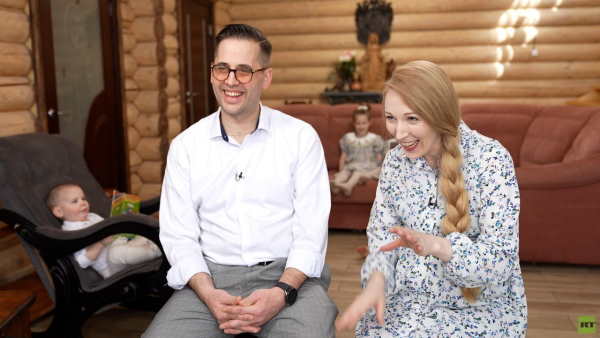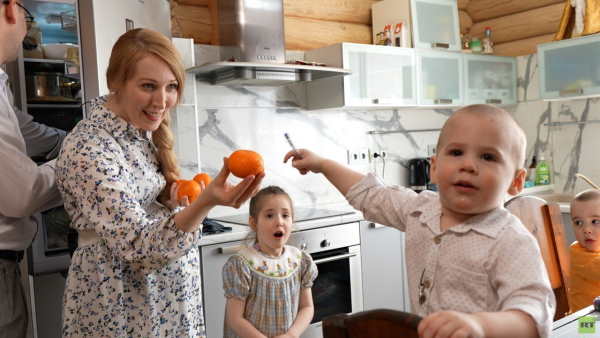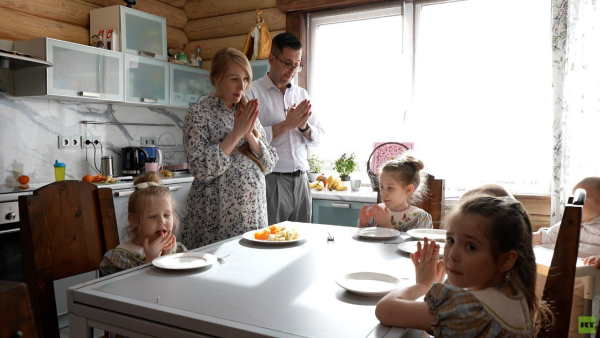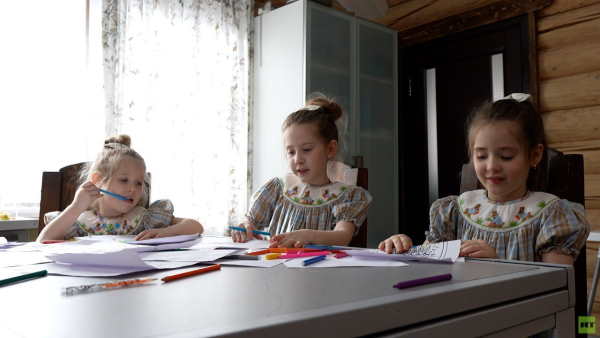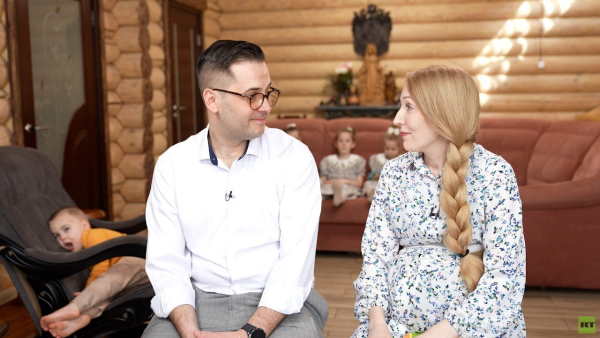It looks like you're using an Ad Blocker.
Please white-list or disable AboveTopSecret.com in your ad-blocking tool.
Thank you.
Some features of ATS will be disabled while you continue to use an ad-blocker.
share:
Hello ATS!
The Rossiya Segodnya publication publishes a large article, “A Leap of Faith: How a Family from Kansas with Six Children Moved to the Moscow Region,” which describes the life of a large family from Texas who moved to live and work in Russia. I bring you this article:
Continued below...
The Rossiya Segodnya publication publishes a large article, “A Leap of Faith: How a Family from Kansas with Six Children Moved to the Moscow Region,” which describes the life of a large family from Texas who moved to live and work in Russia. I bring you this article:
"The large Schutzman family came to the Moscow region from Kansas. They decided to change their place of residence because of LGBT* propaganda, from which they want to protect their children. In July 2024, the seventh child will be born in the family. RT visited the Schutzmans and saw how they are settling into Russia.
38-year-old Joseph Schutzman, who moved to the Moscow region from Kansas in September 2023 with his wife and six children, calls his move to Russia a “leap of faith.”
Joseph is from Texas, and his 36-year-old wife, Ann, is from Australia. In the USA, Schutzman worked as a program manager in the IT field. “I worked in this field for 11 years. He worked in large IT companies: Microsoft, Red Hat, Oracle,” he tells RT.
Anne worked as a nurse, and after the birth of her eldest daughter, Florin, she became a housewife. “Now we have six children,” Anne smiles. “Florin is seven years old, Clotilde is five years old, Marie Antoinette is four years old, Joseph is three, Jean-Jacques is two years old, Wolfgang is eight months old, and we have our seventh child on the way—Mikhail will be born in July.”
The Schutzmans began thinking about moving from the States several years ago, and the last straw was changes in legislation regarding the change of gender of children.
“I think that the changes in US legislation regarding the change of gender of children have filled the cup of our patience,” Joseph tells RT. “When these laws were adopted, we realized that the decision was right, we need to leave right now. Yes... America cannot be avoided while inside America.”
Ann Schutzman adds that by changing their place of residence, they took care not only of their children, but also of the next generations of the family.
“Let’s say we can fight this and protect our children for another five to ten years. But what about our grandchildren and great-grandchildren? We won't be there to protect them. As a result, our grandchildren will grow up among crazy people,” she noted.
According to the Shutsmans, Russia is one of the few Christian countries where family values are preserved.
“In Russia they are against exactly what we are against. When I visited Russia in February 2023, I was simply amazed by what I saw. Of course, it was as if scales had fallen from our eyes after what we heard about Russia in America. We said: “This is a wonderful place, we want to move here,” Shutsman tells RT.
According to Joseph, preparing to leave with a large family was not easy.
“Naturally, we had to part with our property - transporting everything would have been too expensive, time-consuming and difficult. Everything that we had acquired in our lives—furniture, art objects, and so on—we had to say goodbye to all of it,” says Schutzman.
The family put their house and car up for sale. And Ann’s mother helped me sort out things and household items.
“My mother is a very businesslike woman. She said, "Let's have a sale." Mom looked after all the children and organized a big sale at our house. Hundreds of people came to us to buy our things. Thanks to her, our basement was freed up. This helped us move quickly,” says Anne.
According to Joseph, they tried not to talk about the reasons for leaving the United States: they were afraid that the American authorities might take their children away from them or cause other problems before leaving.
The Schutzmans arrived in Russia in September 2023 via Turkey. At first I had to live in a hotel because the owners of private houses refused to register their rental housing. However, they soon managed to find a good house with a large plot.
“We chose the Moscow region because we wanted to live with our children in the countryside in our own house - and at the same time not far from Moscow. We are traditionalist Catholics; we have our church in Moscow. But we are still probably much closer to the Orthodox Church than to our “mainstream” one,” says Schutzman. “There are also very good options here in terms of schools. We will not have to face the same problems that we faced in America, even in Australia: the “new agenda”, LGBT*. This is a huge relief for us. But for now we will teach the children at home: a Russian nanny will come to us, and the children will be able to quickly learn the language.”
The family came to Russia on a tourist visa. In February 2024, they received a quota under which they were able to apply for temporary residence permits.
“We really hope that we will have time to quickly issue these documents. With a tourist visa, we could only stay in Russia for 180 days—on the last day we managed to submit documents for a temporary residence permit. Otherwise, I would have to leave the country. With such “baggage”, as you understand, this is not so easy to do. Now we have only four months to obtain this status," says Schutzman."
Continued below...
“According to the head of the family, they have become “pioneers”; many of his friends now also want to move to Russia. This year, some friends are planning to visit them to see the country with their own eyes.
Schutzman says that since moving to Russia they have been studying Russian culture and cuisine. Joseph's wife is trying to cook some dishes at home.
“My wife learned to cook borscht from different types of meat. We also really like the dumplings recipe from GUM. They're really good. In our family, Ann often makes porridge for the children for breakfast. When we were in America, we only ate oatmeal, but in Russia we saw a variety of cereals. We’ll try them all,” Shutsman tells RT. — I don’t know how Russia does it, but, for example, you have completely different fruits! They are ripe right in the store, and they have a special taste. In America, the same citrus fruits are dry and tasteless! In the US, fresh fish is expensive, and we couldn't afford it. But here in Russia, seafood is plentiful and affordable.”
The Schutzmanns were so amazed by the quantity and quality of food in Russia that on their seventh birthday, their eldest daughter Florin wanted to go to the supermarket. There she and her father filmed a vlog for their channel.
“For the birthday of our eldest daughter, Florin, we went to the supermarket and filmed a vlog. That feeling when people living in Russia wondered: “Why did you bring the poor child to the supermarket for his birthday? Take her to the planetarium." But they don’t understand that for us this is a planetarium!” - says Joseph.
Now the family actively continues to study Russian. The children take online classes, but Joseph felt that face-to-face classes would be more productive.
“Now, of course, we communicate in Russian with our neighbors, in stores, in transport. A mobile translator is a big help. We have been living here for some time, we have learned some grammar and vocabulary. I understand what is being said, and I can give an answer, albeit a primitive one,” Joseph laughs. — Russian is not the easiest language. Therefore, I would like it to be assumed that we will need some time to learn business communication in Russian. And to have the opportunity to practice my Russian in the business sphere.”
Joseph is now planning to get a job at an IT company. But, as he told RT, finding a job is not easy: because of the quota they received in the Moscow region, he could not find a job in Moscow for a long time.
“I don’t have a job at the moment, but I had interviews with Russian companies, and last week I received a job offer. So I'll be working with them soon. Now we just need to resolve some issues regarding immigration so that everything is in accordance with the law,” said Schutzman.
State Duma deputy, member of the State Duma Committee on International Affairs Maria Butina, in a conversation with RT, talks about the large number of families who move to Russia, and calls this phenomenon “ideological migration.”
“People from all over the world - both our compatriots and just sensible foreigners - travel to Russia with their entire families in order to have time to get on this very Noah’s Ark, while general soda is raging around,” says Butina. “And the second factor of migration is our employment opportunities.”
On my own behalf, I would like to add that according to the Russian Ministry of Internal Affairs, 150,000 families from Western countries considered unfriendly in Russia have now submitted applications to move to Russia.
Thank you.
a reply to: RussianTroll
And hundreds of thousands have LEFT Russia since 2022.
www.edwardconard.com... erbating-an-acute-labor-shortage-theeconomist/?view=detail
www.economist.com...
150,000 families from Western countries considered unfriendly in Russia have now submitted applications to move to Russia.
And hundreds of thousands have LEFT Russia since 2022.
They found that between 817,000 and 922,000 people have left Russia since February 2022.
www.edwardconard.com... erbating-an-acute-labor-shortage-theeconomist/?view=detail
Russians have emigrated in huge numbers since the war in Ukraine.
www.economist.com...
a reply to: RussianTroll
Sorry, how many of your own people choose to do the off and run for foreign hills before that piece of scum Putin could conscript them into his senseless war?
More than 150,000 any road that's for sure.
Sorry, how many of your own people choose to do the off and run for foreign hills before that piece of scum Putin could conscript them into his senseless war?
More than 150,000 any road that's for sure.
Bye.
And for MAGA, if you hate America so much, book a flight. NO ONE will miss you.
That means you too Marj Green.
And for MAGA, if you hate America so much, book a flight. NO ONE will miss you.
That means you too Marj Green.
edit on 17-4-2024 by Disgusted123 because: (no reason given)
Considering that a million people have left Russia in the past two years, I'm sure that one American family leaning America to live in Russia will
find plenty of room there. Information Here
a reply to: FlyersFan
It seems to me that by evening your million will turn into 10 million.)))
Firstly, more than half of the relocants have already returned.
Secondly, you are adding more migrant workers returning to their homeland.
But in any case, it’s better in Russia than, for example, in Israel)))
It seems to me that by evening your million will turn into 10 million.)))
Firstly, more than half of the relocants have already returned.
Secondly, you are adding more migrant workers returning to their homeland.
But in any case, it’s better in Russia than, for example, in Israel)))
originally posted by: RussianTroll
Firstly, more than half of the relocants have already returned.
Secondly, you are adding more migrant workers returning to their homeland.
Says you. The facts say otherwise.
Like I said ... this ONE family from America will have plenty of room in Russia.
The Russians are leaving in mass numbers. Especially the young ones.
ON TOPIC - the family will have plenty of room in Russia since so many Russians are leaving. They should find housing cheap.
Information Here
This outflow can be broadly categorised into three groups. First, there are those who left for political reasons, who were facing persecution due to their political and civic activities or statements. Others chose to leave to avoid the risk of persecution or to avoid being compelled to stay silent about their views on the war. Second, there are employees of international or foreign-affiliated companies with extensive business ties. The imposition of sanctions made their normal activities in the country increasingly complex, prompting some to seek alternative locations. And finally, the least politicised group includes those who fled the threat of conscription.
1/4 of Russians under the age of 25 want to leave Russia for good.
It's almost the same figure for ages 25-39.
Statistics Here
ON TOPIC - And the opening post talks about how the father is in IT. So .. ON TOPIC .. the father should have no problem finding work in Russia since 10% of the IT work force has left Russia in the past two years.
Russias Top Talent Fleeing to Other Countries
Young Russians are leaving their homeland in waves. The Washington Post called the current exodus “a tidal wave on scale with emigration following the 1917 Bolshevik Revolution and the Soviet Union’s collapse in 1991.”
About 1 million Russians have left since 2022, including an estimated 100,000 IT specialists who comprise 10% of the technology sector.
Many young, highly educated Russians who speak foreign languages and travel abroad decided they have a better future outside of Russia.
Russians Migrating to NYC Skyrocketing
In Bay Ridge, Brooklyn, Gennadii Zimin is hard at work, typing on his computer. It’s the only way he can use his voice for a fight over 5,000 miles away. He’s from Siberia, and about 15 years ago, he was part of Russia’s army.
But now he posts on social media every day, criticizing the Russian invasion of Ukraine.
The final straw for him leaving came in the fall, when he and his wife said Russians were being forced to join the fight, even being pulled out of their beds in the middle of the night.
edit on 4/17/2024 by FlyersFan because: (no reason given)
Funny how your article fails to mention the part where the Kremlin-owned bank refused to give them access to their money. Or the part where the wife
posted on social media that they've made a mistake in moving only for them to be promptly visited by the government.
a reply to: FlyersFan
What are these facts? This is primitive propaganda. Yes, in the fall of 2022, many young people left, fearing mobilization, mainly to the countries of the former USSR. According to RBC, every fourth relocant who changed their place of residence to another country in 2022 again indicated Russia, noted HeadHunter. Based on the survey results, specialists involved in residence permit issues estimated the share of returnees at 40%.
This is as of the end of 2023.
In addition, your posts will be deleted due to deviating from the topic of the post. Stick to the topic, don't preach.
What are these facts? This is primitive propaganda. Yes, in the fall of 2022, many young people left, fearing mobilization, mainly to the countries of the former USSR. According to RBC, every fourth relocant who changed their place of residence to another country in 2022 again indicated Russia, noted HeadHunter. Based on the survey results, specialists involved in residence permit issues estimated the share of returnees at 40%.
This is as of the end of 2023.
In addition, your posts will be deleted due to deviating from the topic of the post. Stick to the topic, don't preach.
a reply to: RussianTroll
You mean this family? Care to post where your incorrect info came from?
www.mirror.co.uk...
bnnbreaking.com...
You mean this family? Care to post where your incorrect info came from?
www.mirror.co.uk...
A conservative, homophobic Christian family who fled Canada to move to Russia over Canada's LGBTQ ideologies now regret that decision.
The difficulties the couple has faced led Anneesa to post a video to the family's YouTube Channel, Countryside Acres, in which she ranted about the language barrier, the money issues and lots of other things she said have gone wrong since the family arrived in the Eastern European country.
bnnbreaking.com...
Seeking Refuge from Ideology: A Canadian Family's Harrowing Journey to Russia
Discover the Feenstra family's harrowing journey from Canada to Russia in pursuit of ideological safety and farming opportunities, only to encounter unforeseen challenges and financial setbacks. Explore the complexities of immigrating based on beliefs and the stark realities that can await those seeking a new life.
originally posted by: Threadbarer
Funny how your article fails to mention the part where the Kremlin-owned bank refused to give them access to their money. Or the part where the wife posted on social media that they've made a mistake in moving only for them to be promptly visited by the government.
You are describing another family. This is a family from Canada, Arend Feinstra, with 8 children, in the Nizhny Novgorod region. At first they really faced difficulties, but now all the issues have been resolved.
Check your sources.
edit on 17-4-2024 by RussianTroll because: correct
originally posted by: RussianTroll
originally posted by: Threadbarer
Funny how your article fails to mention the part where the Kremlin-owned bank refused to give them access to their money. Or the part where the wife posted on social media that they've made a mistake in moving only for them to be promptly visited by the government.
You are describing another family. This is a family from Canada, Arend Feinstra, with 8 children, in the Nizhny Novgorod region. At first they really faced difficulties, but now all the issues have been resolved.
Check your sources.
Caught out lying again RT!!
Many famous Americans have stayed in Russia for a while. Bill Clinton, Lee Harvey Oswald, to name just two. They had their reasons at the time. They
both came back unfortunately.
edit on 17-4-2024 by BeyondKnowledge3 because: (no reason given)
a reply to: RussianTroll
Let's hope they won't share the fate of the couple from Canada who also moved to Russia to "escape from LGBT ideology."
Conservatives who moved to RUSSIA with family to escape LGBT ideology now says she hates it because locals don't speak English... then begs for forgiveness after Kremlin hears insults.
I tip my hat to these people though. At least, they put their money where their mouth is. All of Putin's fans who keep complaining about the "rotten West" and praising Russia should pack their bags and move there so that they will feel for themselves what the totalitarian regime looks like. And if they have their bank accounts frozen, are forced to make public apologies or worse, they are sent to prison well... Sometimes, you have to educate the stupid the brutal way; that is hang the fool upside down and beat his brain out of his butt back to his head where it belongs. With a baseball bat preferably.
Let's hope they won't share the fate of the couple from Canada who also moved to Russia to "escape from LGBT ideology."
Conservatives who moved to RUSSIA with family to escape LGBT ideology now says she hates it because locals don't speak English... then begs for forgiveness after Kremlin hears insults.
I tip my hat to these people though. At least, they put their money where their mouth is. All of Putin's fans who keep complaining about the "rotten West" and praising Russia should pack their bags and move there so that they will feel for themselves what the totalitarian regime looks like. And if they have their bank accounts frozen, are forced to make public apologies or worse, they are sent to prison well... Sometimes, you have to educate the stupid the brutal way; that is hang the fool upside down and beat his brain out of his butt back to his head where it belongs. With a baseball bat preferably.
edit on 17-4-2024 by twistedpuppy because: (no reason given)
originally posted by: RussianTroll
your posts will be deleted due to deviating from the topic of the post. Stick to the topic, don't preach.
The posts ARE on topic. I said that the family will have plenty of room in Russia since so many of the Russians are leaving. They should find cheap housing. And the father in the American family works in IT ... I showed that 10% of Russias IT workers have left the country so there is also plenty of room for that Father to find work in Russia.
Totally on topic.
edit on 4/17/2024 by FlyersFan because: (no reason given)
It's funny, Ive been searching the internet and can't seem to find a single refrence to the American people RT claims to have left Russia other than a
single Russian website which others link to?
Are these fake images and a fake story produced to throw people off the real story of the canadian family I wonder as their Youtube vid is getting more traction?
We all know RT loves posting fake images....
Are these fake images and a fake story produced to throw people off the real story of the canadian family I wonder as their Youtube vid is getting more traction?
We all know RT loves posting fake images....
edit on 17-4-2024 by Kurokage because: (no reason given)
First of all, good bye!. If you want things better in your own country, stay and fix them!
Second, how many kids is this family supposed to have? Because it says the 7th is on the way, But I am only seeing 5 in the pictures.
Did they sell one for the move? Or is the whole story BS?
Second, how many kids is this family supposed to have? Because it says the 7th is on the way, But I am only seeing 5 in the pictures.
Did they sell one for the move? Or is the whole story BS?
a reply to: RussianTroll
I hope they are quite happy and content with their lot.
Each to their own.
People move from one country to another for all sorts of reasons.
Why is this one example such a big deal?
I hope they are quite happy and content with their lot.
Each to their own.
People move from one country to another for all sorts of reasons.
Why is this one example such a big deal?
new topics
-
Liberal Madness and the Constitution of the United States
US Political Madness: 13 minutes ago -
New York Governor signs Climate Law that Fines Fossil Fuel Companies
US Political Madness: 7 hours ago
top topics
-
This is why ALL illegals who live in the US must go
Social Issues and Civil Unrest: 14 hours ago, 18 flags -
New York Governor signs Climate Law that Fines Fossil Fuel Companies
US Political Madness: 7 hours ago, 12 flags -
Former ‘GMA Producer’ Sues NPR-Legacy Media Exposed
Propaganda Mill: 17 hours ago, 9 flags -
UK Borders are NOT Secure!
Social Issues and Civil Unrest: 15 hours ago, 6 flags -
Meta Llama local AI system is scary good
Science & Technology: 12 hours ago, 6 flags -
Liberal Madness and the Constitution of the United States
US Political Madness: 13 minutes ago, 1 flags
active topics
-
Panamanian President-“every square meter” of the Panama Canal belongs to Panama.
New World Order • 47 • : DoubleDNH -
‘Something horrible’: Somerset pit reveals bronze age cannibalism
Ancient & Lost Civilizations • 25 • : BrucellaOrchitis -
Liberal Madness and the Constitution of the United States
US Political Madness • 0 • : Flyingclaydisk -
The Mystery Drones and Government Lies --- Master Thread
Political Conspiracies • 154 • : Flyingclaydisk -
New York Governor signs Climate Law that Fines Fossil Fuel Companies
US Political Madness • 12 • : Flyingclaydisk -
Elon Musk futurist?
Dreams & Predictions • 14 • : cherokeetroy -
UK Borders are NOT Secure!
Social Issues and Civil Unrest • 6 • : angelchemuel -
Trump says ownership of Greenland 'is an absolute necessity'
Other Current Events • 53 • : cherokeetroy -
Happy Hanukkah…
General Chit Chat • 23 • : JJproductions -
This is why ALL illegals who live in the US must go
Social Issues and Civil Unrest • 23 • : WeMustCare



